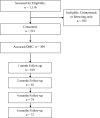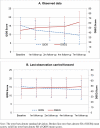Results from a trial of an unsupported internet intervention for depressive symptoms
- PMID: 25485233
- PMCID: PMC4254733
- DOI: 10.1016/j.invent.2014.09.002
Results from a trial of an unsupported internet intervention for depressive symptoms
Abstract
Internet interventions provide an option for those who either cannot or choose not to engage with traditional treatments. Most research on internet interventions involves guided or supported interventions. However, unsupported interventions offer considerably more scalability and cost-effectiveness, which makes them attractive for large-scale implementation. In this study, 309 participants recruited via Google AdWords entered an unsupported cognitive-behavioral internet intervention for depressive symptoms. To maximize the ecological validity of the study, participants received no incentives or live contact with study personnel. Furthermore, the study was open to individuals at any level of depressive symptoms, and all participants received the active intervention. The main outcome measures were depressive symptom level and self-efficacy in managing depressive symptoms. At follow-up, depression scores were significantly lower than baseline scores at each follow-up point (1, 2, 4, and 7 months), with pre-post effect sizes ranging from medium to large. Follow-up depression self-efficacy scores were significantly higher than baseline scores at each follow-up point, with pre-post effect sizes in the medium range. The results remained significant when analyzing only participants with depression scores indicative of a presence of a major depressive episode; results likewise remained significant when employing the conservative last observation carried forward convention, even in the presence of high attrition observed in this study. The results illustrate the potential of unsupported internet intervention to address the health needs of the global community.
Keywords: global health; internet intervention; major depression; self-help; unguided intervention; unsupported interventions; worldwide.
Figures
References
-
- Andersson G, Cuijpers P. Internet-based and other computerized psychological treatments for adult depression: a meta-analysis. Cognitive behaviour therapy. 2009;38:196–205. - PubMed
-
- APA . Diagnostic and statistical manual of mental disorders. Author; Washington DC: 2000.
-
- Bandura A. Guide for constructing self-efficacy scales. In: Pajares F, Urdan T, editors. Self-efficacy beliefs of adolescents. Information Age Publishing; 2006.
-
- Beck AT, Rush AJ, Shaw BF, Emery G. Cognitive therapy of depression. Guilford Press; New York: 1979.
Grants and funding
LinkOut - more resources
Full Text Sources
Other Literature Sources



